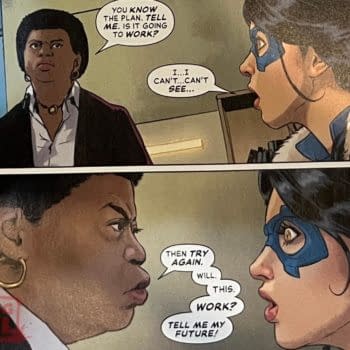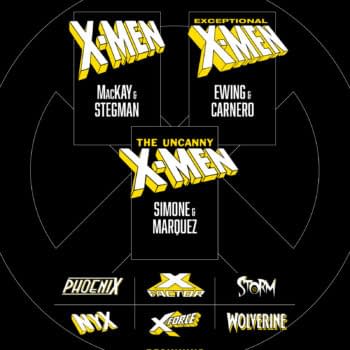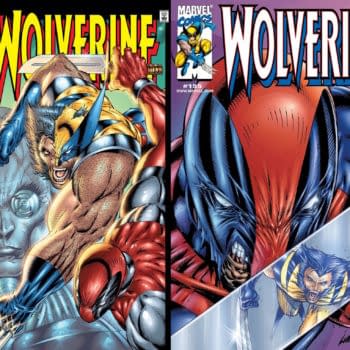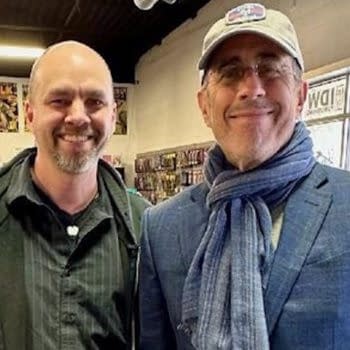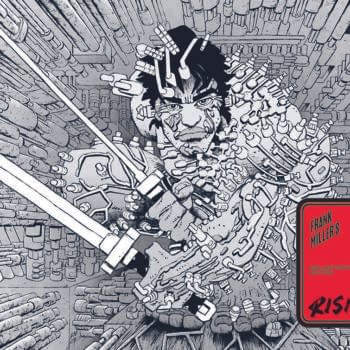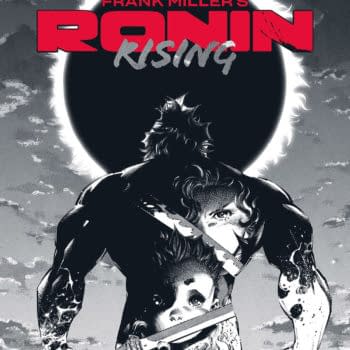Posted in: Comics | Tagged: bioshock infinite, games
The Unfortunate Subtexts Of The Sad Dad Game – Look! It Moves! by Adi Tantimedh
Adi Tantimedh writes;
WARNING: SPOILERS FOR BOTH BIOSHOCK: INFINITE AND THE LAST OF US
I've played through both BIOSHOCK: INFINITE and THE LAST OF US, two of the best games of this year, and both provide lots of food for thought. They're both about being Sad Dads and many other things, including unintended subtexts.
Bioshock: Infinite is set in the late 19th Century, on a steampunk floating city founded by a religious zealot who pushes American exceptionalism with all its brutal racism and economic exploitation to its logical conclusion, which is destruction for all. The Last of Us takes place in a post-apocalyptic America at least 20 years from now where society has collapsed due to an outbreak of fungal spores that turn infected humans into shrieking, ravenous zombies.
In both games, you play a man of violence: in Bioshock: infinite, you are Booker DeWitt, a half-Native American veteran of Little Big Horn who has blood on his hands and whose default reaction to any crisis is to shoot and kill his way out of it. In The Last of Us, you play Joel, a smuggler who has had to do anything and everything it took to survive.
Much has been written about how both games are parables of Fatherhood: both Booker and Joel are charged with escorting and protecting a young girl to safety. Some people have said that this is an indication of Games reaching a sort of maturation, that games developers were at a point where they had families and children and would begin to explore that aspect of their lives beyond just macho fantasies of shooting demons, zombies or aliens. Bioshock: Infinite locates that in an epic allegory where one father tries to correct a mistake that led to a catastrophe of not only epic but cosmic proportions that reach across Time and Space. The Last of Us puts that theme on an even more intimate level, informing all of Joel's actions. Both games are at their heart about the anxieties and fears of fatherhood.
There are more similarities between the two games besides them both starring the excellent Troy Baker as the hero: both games share the same cynical political outlook.
In Bioshock: Infinite there's the discourse on American History, exceptionalism, religious zealotry, racism and class exploitation in Bioshock: Infinite that's embedded in the visuals, the narrative and the gameplay that's got some right-wingers up in arms, claiming its views were unfair. In The Last of Us, America has collapsed into a military dictatorship ruling what's left of society under martial law with a rebel group called the Fireflies opposing them with bombings and raids.
This is another area where both games share a political theme: that neither government forces nor the group that opposes them are to be trusted.
In Bioshock: Infinite, all-out class warfare breaks out when the downtrodden of Columbia revolt: the black people, the Irish, the working class. The rebel group Vox Populi (Latin for "popular voice") are led by Daisy Fitzroy, a black former scullery maid framed for murder turned revolutionary leader. She has a legitimate grievance against the rulers of the city. However, she is portrayed as a bloodthirsty zealot who cynically wants to control her legend and narrative for future posterity.
In The Last of Us, the Fireflies are lead by an African-American woman named Marlene, who's so weary after years of fighting the government and trying to find a cure for the fungal plague that she has decided that the ends justify the means.
Daisy Fitzroy and Marlene are both variations of the same character, despite neither writing teams from either game being conscious of what the other was planning during development and production.
I won't spoil the story any further, but you can probably guess that these being video games, your hero does not resolve things by sitting down to tea and crumpets with these women.
The heroes' – and thus the writers and the players' – reactions to these rebel factions is what troubles me. It's a "plague on both your houses" attitude, where neither side is considered good, even when the opposition has a moral justification for fighting the government. Both sides are portrayed as being utter dicks to the hero, and by proxy, you the player, so you feel perfectly justified in pulling out your gun and blasting them all to buggery. The reactions you are manipulated into feeling are nowhere as complex as claimed. How else do you react to cynical people trying to kill you other than rejection and revulsion?
At best, it's disingenuous. At worst, it's glib, cynical and nihilistic in an unearned and lazy way. It is a rejection of political awareness and engagement at a time when it's more necessary than ever. It strikes me as a particularly American political stance of not wanting to commit to one side or another by deliberately claiming both are bad, then naively sticking to individualism that completely ignores historically-proven precedents where political and social change have always been brought about not by individual but collective action.
The writers of both games are very smart people, and I think politically they probably lean on the liberal side, but I get the feeling they didn't think this bit all the way through. I know that games design and development is difficult, and there's not a lot of room for subtlety. Genre stories being melodramas, it's easiest to just start shooting everyone. Did they settle on an easy answer to how to meld story and gameplay? Since the gameplay design is based entirely on fighting, it seems easier to fight rather than find an alternative, and I'm not talking about just sneaking past enemies before they see you.
And what is up with the strange coincidence of both games featuring black women as leaders of an opposition that both turn out to be duplicitous and untrustworthy? While both games go to great lengths to counter the usual sexism and misogyny of many games, they inadvertently end up equating the political left with an uncomfortable class, racial and gender representation. Because of this, I'm pretty sure that no women of colour were on the writing teams of either game. It also doesn't really help that every black character in The Last of Us doesn't make it out alive in the story, another unfortunate, unconscious reiteration of "the black guy dies first" trope that's been far too common in movies and games. These are all indications that both games were written from an American white, male perspective.
What does this tell us? That these games subconsciously reflect the white, male fear of African-American women? And The Left? One can't help but wonder…
Let's just talk, not shootat lookitmoves@gmail.com
Follow the official LOOK! IT MOVES! twitter feed at http://twitter.com/lookitmoves for thoughts and snark on media and pop culture, stuff for future columns and stuff I may never spend a whole column writing about.
Look! It Moves! © Adisakdi Tantimedh













